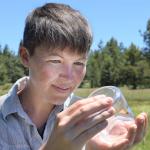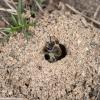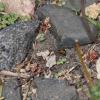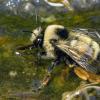Every spring, the Xerces Society gives out at least two awards for students engaged in research related to Lepidoptera conservation. These grants, made possible through the Joan Mosenthal DeWind Awards program, were established by Bill DeWind in his wife’s honor. Joan was an early member of the Xerces Society with a passion for butterflies and engaging young entomologists. This year, we are thrilled to announce our two awardees, both of whom are PhD candidates: Chris Cosma and Brendan Carson.
Chris Cosma, based at the University of California-Riverside, is studying moth pollen-transport networks in dryland habitats of southern California. Moths are generally underappreciated insects even though their pollinator services can rival those of better studied species like bees. Recent research has shown that moths are generalist pollinators of entire plant communities, playing a crucial role in pollen-transport networks. Chris’s research aims to better understand the structure and stability of these networks in the Southwest, particularly in light of climate change. The results of his work can help inform conservation strategies by identifying species at risk and those that are particularly important for community stability.

[Left] DeWind awardee Chris Cosma. [Right] Chris checks a moth light trap the morning after a successful collection night in the desert. (Photos courtesy Chris Cosma.)
Brendan Carson, who is based at the Crone Lab at Tufts University, will use the DeWind award to investigate population- and community-level transmissions of a novel densovirus (known as JcDNV) that may be impacting the Baltimore checkerspot (Euphydryas phaeton) in New England. Relatively little is known about how viruses and other pathogens affect butterflies of conservation concern, and this particular virus was recently found in a number of Baltimore checkerspot populations. Although considered common in New England, the butterfly is of conservation concern in other parts of its range, and there is speculation that this virus could be a factor in large population fluctuations that have been documented. In order to predict how this virus might spread in a population, more information is needed to understand how it is being transmitted. This will be a key focus of Brendan’s DeWind-supported research, the results of which will be incorporated into his larger dissertation examining the role densoviruses play in butterfly population dynamics.

[Left] DeWind awardee Brendan Carson in the field. [Right] Brendan holds a Baltimore checkerspot at a field site. (Photos courtesy Brendan Carson.)
Further Reading
DeWind Awards are given out annually. The 2023 cycle will open in November 2022. If you or someone you know is a student pursuing research related to Lepidoptera conservation, please consider applying or sharing the word!
For more information about the DeWind Awards, please review these Frequently Asked Questions.
Read more about previous awardees and their projects.




